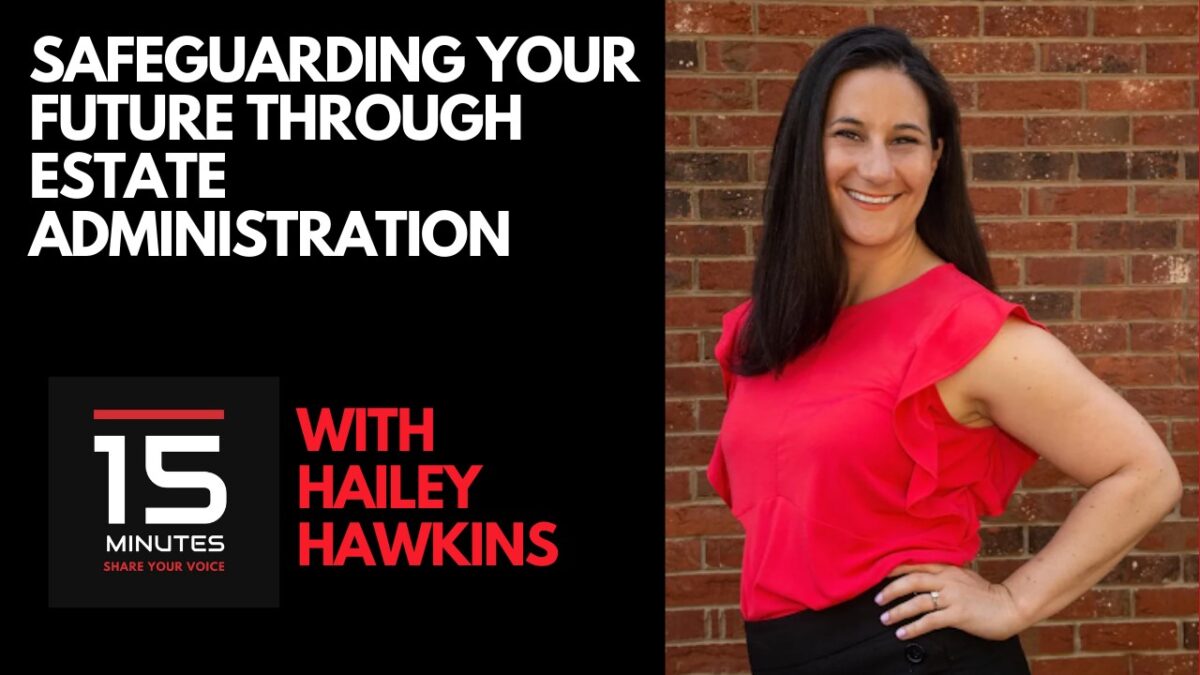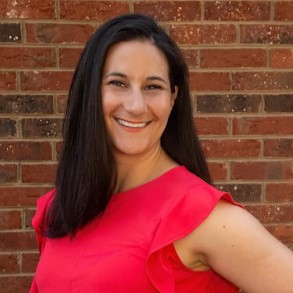
Safeguarding Your Future Through Estate Administration With Hailey Hawkins


Hailey Hawkins is the Managing Partner at Stott, Hollowell, Windham & Stancil, specializing in estate administration and guardianships. She is responsible for representing incompetent adults as a public guardian and serves as a guardian ad litem in incompetency proceedings. Prior to her legal career, she taught high school math through the Teach for America program in North Carolina. She merged her law practice in 2021, expanding it from two to nine attorneys. Hailey’s practice offers individualized guidance through some of life’s most challenging transitions, ensuring families are protected and prepared for the future.
Here’s a glimpse of what you’ll learn:
- [1:39] Hailey Hawkins talks about what Stott, Hollowell, Windham & Stancil specializes in
- [2:35] How Hailey handles the unique aspects of estate administration and guardianships
- [3:24] The crucial need and power of healthcare and durable powers of attorney in estate planning
- [4:26] Insights into the process and cost of appointing a guardian without proper prior planning
- [5:34] Understanding the different types of guardianships and their impact
- [7:18] How simple preplanning with power of attorney can prevent complex legal issues
- [8:31] Gaps in spousal rights without a power of attorney in place
- [9:55] Hailey’s advice for listeners to ensure their estate planning is proactive
- [15:04] Why people should seek attorneys specializing in estate planning rather than general practice
- [24:02] The multifaceted experience and lessons from navigating a law firm merger
In this episode…
Are you prepared for the unexpected turns life might take, and do you know how early planning can protect your future and your family? What measures can you take today to ensure your affairs are in order should you no longer be able to manage them yourself?
According to Hailey Hawkins, a legal expert specializing in the intricate fields of estate administration and guardianships, initiating estate planning early is essential. She emphasizes that tools such as durable power of attorney and healthcare directives can safeguard individual autonomy and alleviate burdens during critical times. By organizing these legal instruments ahead of potential incapacity, individuals can prevent contentious guardianship battles and avoid the significant financial costs typically associated with court proceedings. Hailey explains that such preemptive steps not only protect the legal and financial interests of the individuals but also preserve familial relationships by clarifying intentions and responsibilities before crises arise.
In this episode of 15 Minutes, host Bela Musits is joined by Hailey Hawkins, Managing Partner at Stott, Hollowell, Windham & Stancil, to discuss the critical aspects of estate planning. They discuss the nuances of legal guardianships, the importance of early planning, and strategies for avoiding common pitfalls that can complicate future legal processes.
Resources mentioned in this episode:
- Bela Musits on LinkedIn
- Gladiator Law Marketing
- Hailey Hawkins on LinkedIn
- Stott, Hollowell, Windham & Stancil, PLLC
Special Mentions:
Quotable Moments:
- “The best remedy you can possibly do is right now…everyone over the age of 18, get a healthcare power of attorney.”
- “It’s the difference between a couple of hundred dollars for a power of attorney and several thousand to get started with a guardianship.”
- “One of the biggest areas we tend to see problems is when people who do not practice in these areas regularly try to draft estate planning documents.”
- “We are helping people through the worst time of their lives, watching your parents slowly die…it’s a lot of hand-holding.”
- “I encourage everybody, go see a local attorney, get your estate planning documents in place.”
Action Steps:
- Schedule a consultation with an estate planning attorney: An attorney can provide tailored advice to ensure your documents fulfill your specific needs and effectively protect your assets and family members.
- Create a healthcare power of attorney: This document designates a trusted person to make medical decisions on your behalf, ensuring your healthcare preferences are honored if you become incapacitated.
- Discuss the possibility of guardianship with your loved ones: Open conversations with family can avoid potential disputes and ensure everyone understands the preferred legal arrangements.
- Educate yourself on the differences between wills and power of attorney: Understanding the legal tools available can help you make informed decisions for your estate planning and future care.
- Establish a durable power of attorney covering financial decisions: Ensuring financial matters are taken care of by someone you trust can mitigate stress and prevent complications in estate administration.
Sponsor for this episode…
This episode is brought to you by Gladiator Law Marketing, where we deliver tailor-made services to help you accomplish your objectives and maximize your growth potential.
To have a successful marketing campaign and make sure you’re getting the best ROI, your firm needs to have a better website and better content. At Gladiator Law Marketing, we use artificial intelligence, machine learning, and decades of experience to outperform the competition.
To learn more, go to gladiatorlawmarketing.com or schedule a free marketing consultation. You can also send an email to adam@gladiatorlawmarketing.com.
Episode Transcript
Intro 0:01
You’re listening to 15 Minutes, where we feature community leaders sharing what the rest of us should know, but likely don’t.
Bela Musits 0:12
Hello, listeners. I’m Bela Musits host for this episode of the 15 Minutes Share Your Voice podcast, where we talk with top notch law firms and attorneys about what it takes to grow a successful law practice. This episode is brought to you by Gladiator Law Marketing. They deliver tailor made services to help your law firm accomplish its objectives and maximize your growth potential to have a successful marketing campaign and to make sure you’re getting the best return on investment. Your firm needs to have a better website and better content. Gladiator Law Marketing uses artificial intelligence, machine learning and decades of experience to outperform the competition. To learn more, go to gladiatorlawmarketing.com where you can schedule a free marketing consultation. Today’s guest on the podcast is Hailey Hawkins. Hailey is a managing partner at a law firm in North Carolina, where she focuses on estate administration and guardianships. She serves as one of the public guardians of the estate for incompetent adults in Gaston County. And as a guardian ad litem for incompetency proceedings. Before becoming a lawyer. She taught high school math through Teach for America in the Charlotte Mecklenburg school system. Welcome to the podcast, Hailey.
Hailey Hawkins 1:34
Thanks for having me.
Bela Musits 1:35
So Hailey, can you tell us a little bit more about the law firm?
Hailey Hawkins 1:39
Absolutely. Um, so we actually started to have an interesting journey. In 2017, it was myself and Stephen Hegedus, and we had a law firm that we were just starting on our own. So it was just the two of us. And then in COVID happened and in 2021, we were approached by another law firm, who asked if we wanted to merge with them. So we ended up merging in 2021. And as a result, we became Stott, Hollowell, Windham & Stancil. And we now went from being a two person law firm to then a three person law firm to now we have about nine attorneys. Oh, wow, full time attorney. So it’s been a very drastic change in the past couple of years.
Bela Musits 2:28
Yeah. And tell our listeners a little bit about your area of practice.
Hailey Hawkins 2:35
Absolutely. So I do estate work. So I have a little bit of a unique perspective on estates, because normally, when you hear someone talk about estates, they’re talking about high net worth estate planning. And I actually do a little bit of the other extreme of that. So my area of focus is guardianships. So what I do is I will do estate administration, so I’ll actually administer wills and help people with powers of attorney when things actually happen. But one of the other areas I do is if someone is declared incompetent, so are unable to act. I help people through that process. And I can either help family members assisting other family members or family and friends, or I can serve in that capacity as well.
Bela Musits 3:24
Oh, wow. So that sounds like a very highly specialized area of the law.
Hailey Hawkins 3:30
It is. It became very famous recently with the Britney Spears incident and some of the other celebrities who have guardianship or conservatorship in other states. It’s not, it’s not really that dramatic or exciting in the real world, necessarily, most people when you’re declared incompetent, there’s not necessarily a lot of question about whether you need help or not. And it is very regulated. So you’re also not at risk of losing? Absolutely everything like you hear on the news, either.
Bela Musits 4:04
Yeah, yeah. So let’s say I called you up. And I said, you know, hey, my mom is, you know, getting up there. She’s got all timers, she really can’t make decisions for herself. Take me through sort of the conversation, you and I would have the questions you would ask me and sort of what the next steps might be?
Hailey Hawkins 4:26
Absolutely. So one of the first things is always done, was there any planning prior to the diagnosis? Because one of the best ways that we can help people is try to get as much planning done as possible prior to any situation happening. If that’s the case, it’s much more straightforward because then it becomes Okay, well, let’s get those documents. This is what these documents mean. This is how you use them. Where we run into more issues is if the person did not properly plan and if there’s no documents in place, then we start talking about an actual medical diagnosis. Did the person receive a medical diagnosis that would say that they actually need a guardian or someone else making those decisions, we need to collect the proper medical documentation. And then we can submit everything to the court and say this person needs to be declared legally incompetent. And we’re asking who should be appointed as the guardian. And there’s two different types of Guardians. In North Carolina, we have a guardian of the person and a guardian of the estate. In other states, the guardian of the estate is called a conservatorship. So that’s probably a phrase more commonly known.
Bela Musits 5:34
Got it. So what are the types of things that we can do in advance?
Hailey Hawkins 5:40
The best thing you can possibly do is your estate planning documents. So will the healthcare power of attorney be the durable power of attorney? Again, normally, when you’re talking about the high net worth estate planning attorneys, which I know you, most people talk to, those stressed the will, they’ll stress trust, they’ll stress these other documents that deal with end of life, where I tend to put a little bit more emphasis is what happens when you’re still alive? And who do you want making those decisions? So those powers of attorney are some of the best defense mechanisms you can have. Because you’re essentially giving someone the full legal authority to make your medical decisions, make your financial decisions, sell all your property, buy new property, get rid of your assets, get new assets. It’s a very powerful document. But when used properly, it can really avoid a lot of drama and the courts.
Bela Musits 6:40
Yeah. And so I had a power of attorney with my mom. So I went through this relatively recently. And it was pretty easy to set up a shoot when we did it. We did this while she was competent. And you know, it was a 45 minute meeting and an attorney’s office signed some documents. And that was it. It was pretty easy. So it seems like if you do this in advance, and you plan ahead, it’s a pretty smooth, straightforward process. And I imagine that once maybe there’s a diagnosis of incompetence or an ability to do to execute a document, then it becomes a little more complicated.
Hailey Hawkins 7:18
Correct. It’s, it’s the difference between and just to kind of put this in monetary perspective. So for that power of attorney, you probably paid a couple $100, right. For a guardianship, the starting fee, and this is here in Gaston County, North Carolina. You know, you’re talking about several 1000 Just to get started. And the court is going to assess v. So in the event that you have the entire estate, passing through a guardianship, you’re actually paying a court fee in North Carolina for dollars for every $1,000 plus a bond. So it’s a substantial fee. And I always tell people when I’m trying to strike, the best possible thing you can do is tell everybody to get your power of attorney, make sure your documents are in place, because if not, the consequences are pretty dire.
Bela Musits 8:11
Yeah. So is there a I’m just curious now. So is there a difference? Like, like, I don’t have a power of attorney. And let’s say I got in a car accident tomorrow. And I was deemed incompetent? Does my wife automatically sorta have that power or not?
Hailey Hawkins 8:31
Not in North Carolina. So I think a lot of people assume and that’s why I say the biggest thing. I’m hoping this podcast can help with that, too. I think people assume that spouses have automatic rights to do a lot of things. And the truth is they don’t. And parents don’t remind our children either. So minor children who are beneficiaries of a will or have to do something that requires legal action, they also need to have a guardian appointed. And it’s not automatically apparent. So I think some of these technicalities, I encourage everybody, frankly, over the age of 18, if you’re over the age of 18, get a healthcare power of attorney, if you have assets, I don’t care how old you are, you’re never guaranteed tomorrow. You should have these documents in place. And I think, unfortunately, what I hear from you is what I hear from a lot of people is they don’t realize they always assume we’re estate planning in this regard. You need someone older or somebody who is closer to the end of life or closer to having mentioned the truth of the matter is at that point, we’re too late. We can’t do all the proper planning. So the best remedy you can possibly do is right now. encourage everybody, go see a local attorney, get your estate planning documents in place.
Bela Musits 9:55
That’s great advice, guys. You know, like you said, I think most people assume that Gender is a dangerous word that yeah, my spouse can take it or if, you know if, if I have minor kids, I’m automatically but that’s not true. And like you we always think about this as like with my mom, it was after my dad passed was just my mom. And then, you know, being her favorite son. I got that responsibility. So that’s really good advice.
Hailey Hawkins 10:23
Well, and I think it’s funny you say my favorite son. I always laugh because the other fun parts of guardianship are when families don’t get along. Yeah. So if you don’t get to pick who you would want to serve, all of a sudden you have everyone thinking they’re the favorite son and arguing over who should get to make those decisions. And those always turn into an exciting adventure of, well, you haven’t visited in three months, or you don’t make as good decisions, I make better decisions, and it can create a little bit of family drama. Yeah, yeah.
Bela Musits 11:00
In my case, being the favorite son was easy, because I’m the only Well, one. So what you just said also sort of reminds me that this can be a very emotional time, emotional time for the people that you’re dealing with. Yeah. And, you know, again, if you pre plan, it’s kind of less emotional, there’s less stress going on in everyone’s life. So how do you sort of help people through those emotional challenges that they’re encountering?
Hailey Hawkins 11:31
Yes, you know, that’s actually a great thing you bring up. I think one of the unique things that we try to do even here is, when I hire, I’m hiring for someone who can be compassionate. Yeah. And really listen to people because we, we always tell our team, you know, we, we are helping people through the worst time of their lives, watching your parents slowly die and have a horrible illness or watching a spouse or, or dealing with the aftermath. Because like I said, we do the estate administration as well. It’s a lot of hand holding, it is a lot of listening. I think this is probably the most I’ve talked in days, most of the time, I just listen. And you just have to let people really express their emotions. And sometimes, you know, they take it out in the wrong way. But for the most part, I still like to think most people are still good at heart and innocent and just haven’t experienced something like this and don’t know what the law is in this area, because it is such a more niche area. So I think when you’re going through it, you’re experiencing things that you’ve never, never experienced that you didn’t know you’d have to experience. So it’s just unique. A lot of patience, a lot of kindness, a lot of understanding.
Bela Musits 13:02
Yeah, yeah, I’m sure it can be very stressful at times for sure.
Hailey Hawkins 13:08
It definitely has its moments. And I think unfortunately, for better or worse, we also get to see people, the true side of humanity. Like at its core, how are people responding? How are families responding, I think it has influenced how my entire team looks at how we live our lives, and how we raise our families and how we interact with each other. And with spouses. And similar to hospice nurses, you hear hospice nurses say that sometimes, too, when they’re talking about what matters at the end of life, we get to watch families go through that, for better or worse on a daily basis. And you see a lot of people really rise to the occasion and be these amazing family members. And then you see some that maybe don’t tear families apart. So I think it’s helpful on our side to give us a better understanding of where people are coming from. And I think that allows us to provide better service, even in the planning stages, just to say, well, let’s talk through what happens if this happens. Because I think, again, the high net worth is a different conversation altogether. But this part of the conversation is okay, so when this actually happens, how is your family going to respond? And let’s be honest about that.
Bela Musits 14:35
Yeah, yeah. Excellent. That’s really, really good advice. And some, thank you for sharing those thoughts. So let’s say that I’m listening to this podcast and I go, Okay, I gotta get my act together. I need to do some of these things. And I don’t live in Gastonia County and North Carolina there. What should I look for? If I’m, you know, going to call up and interview a couple of attorneys, what type of questions should I ask?
Hailey Hawkins 15:04
You want to make sure you’re getting someone who actually does estate planning, I think that’s probably probably one of the biggest things that you can possibly do is make sure that it is somebody who actually knows what they’re doing what they’re talking about, and isn’t dabbling in estate planning, I think where we see a lot of mistakes on fourth, because A, so as a firm, we also do some of the litigation sides of things. So when things go wrong, when things are not clearly explained, we help with that. And one of the biggest areas we tend to see as people who do not necessarily practice in these areas regularly, saying like, you draft you, uh, well, I learned how to do that in law school. And I always say, look at people’s websites, I believe that the website is really significant. If you see that the attorney focuses on estate planning, or if there’s state planning on their website, and it appears to be a primary practice area, they’re probably a really good resource. Different states have different rules on board certified specialization. I can’t necessarily go to one, because I’m not one. Yeah. But I do think that that’s helpful as well, just getting personal recommendations in the area, saying those who know I think lawyers tend to know who’s good in the practice area, from a perspective.
Bela Musits 16:31
Yeah. So it brings up an interesting question, how do you guys find your clients?
Hailey Hawkins 16:36
So we have a lot of word of mouth. Admittedly, Gaston is kind of unique. It’s right on the outside of Charlotte. So we are not in the Charlotte area. We do practice in Charlotte, but we are right outside of Charlotte. It’s a smaller county. So as a result, there’s I want to say 100-150 People in our bar, it’s a very small bar. We all know each other pretty well. So a lot of it is word of mouth and you get a reputation for how you handle cases. We do, I mean, we advertise online, we write blogs, we do all the more traditional things. Some of my younger team members are venturing into Tik Tok. We’ll see how that goes. I’m a little bit more hesitant on that. But uh, we tried to do online marketing. We do a lot of the advertising in the community, but most of it is word of mouth. Yeah.
Bela Musits 17:33
Excellent. Excellent. So another question I had is, is the whole firm all focused on this area? Or is it just certain attorneys?
Hailey Hawkins 17:44
Just me, actually. So I’m counting on you in guardianships. So how we’ve structured our firm, and I think that’s where it’s allowed us to also get this word of mouth referral basis. Every attorney focuses on one of these little niche areas, essentially. So as a firm, we’re able to offer multiple different practice areas, we have real estate , we actually do have three attorneys who do real estate because we do residential and commercial. We have petitions to partition, we have surplus funds, we have estate administration, we have family law, we have an attorney who does family law, she’s wonderful. And then we have a civil litigator who kind of does a little bit more of the breach of contract, personal injury type of situation. So it’s nice because we can offer these different practice areas, but everyone has their own area that they focus on. And we can also bounce ideas off each other. So if I have an issue with a real estate question, I’m not going to try to figure it out myself. I’m going to walk across the hallway and go ask one of my partners.
Bela Musits 18:47
Yeah, no, that’s great. That sounds like a very nice, legal firm put together with a bunch of different skills that a client can come to one place and get that broad spectrum of advice and services and counsel. And that’s great. Yeah. So let’s talk a little bit about sort of the merger, right? There’s a fair number of attorneys who sort of listened to this podcast. And so can you whatever you’re comfortable sharing kind of talk about sort of what that process was like for you guys. Okay, why did you decide to do it? And then sort of what maybe some some, what are some of the surprises going through that process?
Hailey Hawkins 19:29
Well, you’ll probably have to cut me off. I feel like I could talk on this for hours. It was a very unique experience across the board. We were It was December of 2020. So just to kind of put that back in context, right at the end of COVID. And I actually at the time had COVID. So I was I was working remotely in my house and my law partner at the time came up and said, Hey, I heard a rumor that this firm might want to merge with us. And I brushed it off at The time I was like, I don’t, I don’t expect this to happen. It was a stop Hollowell just for a little bit of context there. This firm had been around since the 40s. It’s been around for a very long time. Apparently COVID hit hard. And it was a firm that the name meant a lot. It’s this huge building and Gastonia. It was one of the largest law firms in Gaston County, which again, there’s, it’s a small county, but it was one of the larger ones in Gaston County. So it was a surprise for them to approach us and very humbling, in many ways, because it was just the, you know, we were a small firm. There were a lot of surprises that team I think things. We did our due diligence, we spoke with a business attorney as well, I would strongly recommend getting real advice from people who actually know what they’re doing that we did consult with a business attorney, we worked with an ERISA attorney trying to merge 401 K’s which was probably one of the more surprising parts of how difficult it was was merging a 401 K. I never want to experience that, again, major shout outs for ERISA attorneys there. And then the personnel is probably one of the most unique things for a merger is you’re inheriting staff from one team and inherit and you’re bringing your own staff in. And Stott Hollowell, in particular, as you can probably guess, just from how old the firm is, the majority of the members of this firm are also older. And Stefan and I are much younger, in the grand scheme of things, I was licensed in 2014. So we tend to have a much different approach, a very different approach on how we approach law, how we approach life, and a lot of different things. So trying to merge cultures that were that different from the old school mentality with the newer age mentality, I would say probably took us about two full years, I would say this past month, is when I would actually feel comfortable saying I think we might have reached a good balance of where everybody is. So those were probably some of the more challenging aspects of it. I think now I can also comfortably say that it was all worth it. It was. Now we also had a unique situation, one of the partners in the original firm in Stott Hollowell. So we merged April 1 of 2021. He did estates. He died April 19 2021. And so here I am, you know this, we newly merged firm, the estates attorney, and I inherited about 85 state cases. And he didn’t use any computer, he had nothing on the computer. It was these thick files, like paper files. I’m like, I don’t even know how to do this. I haven’t picked up a paper file. And you’re so we had a lot of unique logins this first couple years. We’re in a good place. And then we were incredibly, incredibly humbled this past year. Jesse Caldwell, who’s a big name down here, but he was a superior court judge, he lost his election, and he asked if he could join us. Wow. So we were incredibly excited about the fact that we did bring him in because he is our civil litigator. So it’s kind of come full circle, we’re now at a good point where we’re growing and can see the forward momentum. So it’s been exciting, but it’s definitely been a journey.
Bela Musits 24:02
Yeah, it sounds like in my previous life, I was the interim president of a small college and we merged with a larger college. So I’ve been through that. And as you were talking, they brought back some of those memories of the challenges, particularly on the cultural piece. And lots of times people don’t pay much attention to that until something bubbles up and explodes. And they go oh my gosh, because you get tied up in sort of the details of, you know, the buildings and the equipment then the ERISA plans. And so, yeah, that brought back some memories.
Hailey Hawkins 24:43
And I think you’re right though, because the culture is what led to us not going in with any intention of letting anybody go. That was not I think some people assume that with mergers. But some people didn’t work out just because not intentionally. Just if it’s a hardship, it’s a hardship for a lot of people at a lot of levels.
Bela Musits 25:07
Yes. And there’s a lot of unknowns. Yeah. And, and when some people do deal very well with an unknown future, other people have a real challenge with dealing with an unknown future. And, and so trying to figure out what different people need for their level of comfort, if you will. And as you said, sometimes it just doesn’t work. And that’s okay. And you sort of look each other in the eye and say, you know, this is great, you’ve been wonderful, but it’s just not working. So let’s figure out something different. Yeah. Yeah, those are challenging times. So you started as a math teacher, so I’m interested in this, right? So you, you, you’re teaching math, and you’re in this kind of program for math. And so talk a little bit about the transition of saying, Okay, I’m going to become an attorney.
Hailey Hawkins 26:07
So I taught through Teach for America, which is normally a two year program. I was not a math major, I was a psychology major. So how it works is they decide where you go, and what you teach. So I was from Pennsylvania, actually, they were like, you’re gonna go to Charlotte, North Carolina, you’re gonna teach high school math. And they had a very intense summer program where they teach you how to teach. And then while you’re teaching, you’re taking classes in math and getting certified as a teacher. So I was, I did eventually get my math and teacher certification. While I was teaching, teaching is probably the hardest job I have ever done and will ever do. It is. I think it was a phenomenal experience. And it gave me so much insight into the public school education system, from a different perspective that I will never look down on those years. I mean, that was just an amazing experience and a lot of great time with those years. But it’s also hard teaching. And after my second year, was actually when I met, who is now my husband. We were both bartending at cheddars on the side, and he was in law school. So as I started looking at what he was doing, I was like, I think I could do this and decided to try that after my third year. I went to law school, and then originally thought I was going to get back into education law. To be completely honest, if you would have asked me in law school, if I was going to do a state’s I would have said very strongly No. I was like, I can’t imagine just dealing with dead people all day. That’s depressing. Like why would anyone want to choose that? So I thought I’d be getting into education law, but I have veered away from the focus with education law being just different than what I thought it was going to be. So I ended up focusing a lot more on family law, and did family law for a couple of years. Thankfully, Joy joined us and took that all off my plate, and sent that happily to her. And then kind of found my niche with the state. So a lot of I’m a very firm believer in trial and error, and more error and failure has kind of led to where I am now, I guess, but trying different things, seeing what else is out there and then finding something that I actually was really passionate about and then can be good at.
Bela Musits 28:50
Yeah, yeah. That’s great life advice. Honestly, that’s a great way to start wrapping this up. So let me ask you a question. Where can our listeners find out more about your law firm?
Hailey Hawkins 29:05
Absolutely. So we are online. Stott, Hollowell, Windham & Stancil. So it’s shws.law.
Bela Musits 29:14
Yep. Very nice website. I’ve been there. Very informative. Very well. Well done. So that’s great. So is there Hailey, is there anything that I haven’t asked you that you’d like to share with our listeners before we sign off?
Hailey Hawkins 29:27
Um, one of the things that I think makes our firm a little bit more unique as well because we are in Gaston County and we are a suburb of Charlotte. Gaston is a very red County. We are a very inclusive firm. And I think that’s the other thing I would encourage since you said mostly lawyers are listening to this. I think when we first started this whole thing, everyone thought we were crazy for advertising on our website that way as well. Being where we are. And I think that’s actually what has allowed us to be offered the position to emerge and to allow us to grow. And I wonder why the Superior Court Judge ended up coming to us. I encourage everyone to just be themselves and be true to themselves and not necessarily be influenced by what’s around them.
Bela Musits 30:19
Yeah. That’s great. Great way to sum this up and in the podcast, Hailey, thank you so much. You’ve been a wonderful guest on the show, and I really enjoyed our conversation.
Hailey Hawkins 30:28
Thank you. And thank you so much for having me.
Outro 30:33
Thanks for listening to 15 Minutes, be sure to subscribe and we’ll see you next time.












